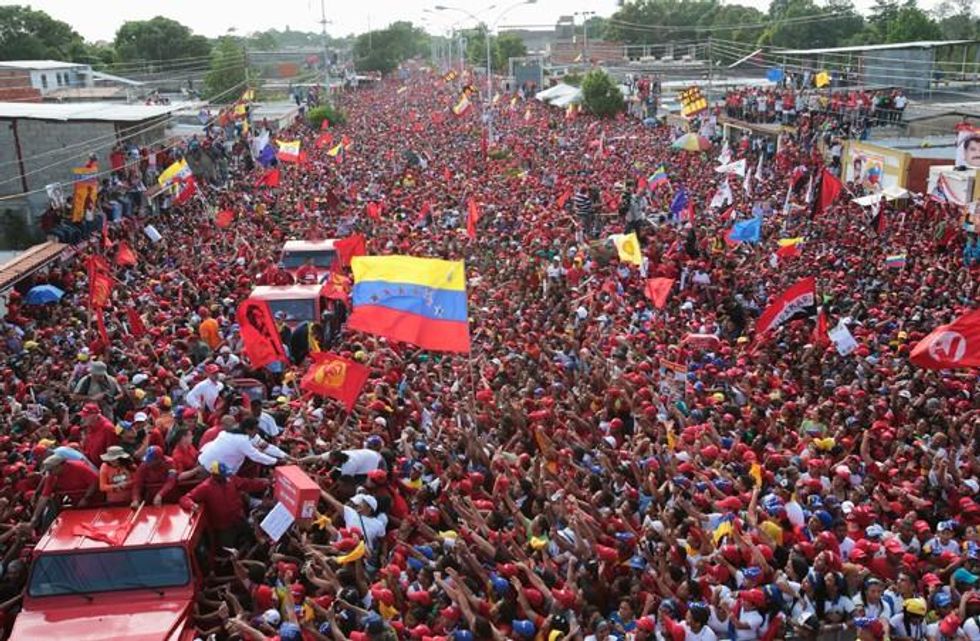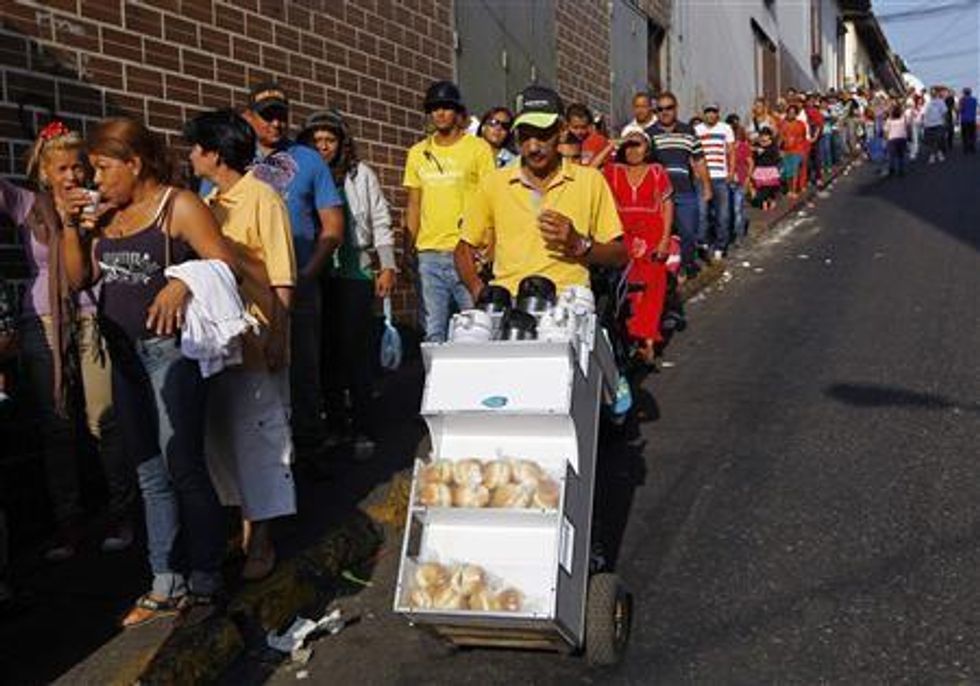

SUBSCRIBE TO OUR FREE NEWSLETTER
Daily news & progressive opinion—funded by the people, not the corporations—delivered straight to your inbox.
5
#000000
#FFFFFF
To donate by check, phone, or other method, see our More Ways to Give page.


Daily news & progressive opinion—funded by the people, not the corporations—delivered straight to your inbox.
Venezuelans headed to the polls on Sunday morning to decide, once and for all, who will be the official successor of the widely beloved, and now deceased, Hugo Chavez.

The Center for Economic and Policy Research is live blogging the day from Venezuela here.
"From the country's Caribbean coastline to its cities and jungle interior," polling centers were due to open from 6 a.m. (0630 EST) until 6 p.m. (1830 EST), Reuters reports, though voting could run longer if there are still lines.
The voters will chose between acting president, and former vice president, Nicolas Maduro, who had a double-digit lead in most opinion polls throughout the race, and Miranda state Governor Henrique Capriles, who lost to Chavez in elections this past October.
Chavez had nominated Maduro -- a former bus driver and union activist -- as vice president following his victory at the polls in October. Chavez lost his battle against cancer on March 5, at aged 58, leaving Maduro as temporary head of state.
Maduro has promised to push forward Chavez's "21st century socialism" if he wins.
"We're going to have a giant victory. The bigger the margin, the more peaceful the country will be," Maduro said. "If the gap is smaller, it is only because they (the opposition) managed to confuse a group of Venezuelans."
Much is at stake for Latin America and, subsequently, for global politics in the election. As Reuters reports:
The winner will inherit control of the world's biggest oil reserves in an OPEC nation whose stark political polarization is one of Chavez's many legacies.
Also at stake is the generous economic aid Chavez provided to left-leaning Latin American governments from Cuba to Bolivia.
* * *
* * *

_______________________
Dear Common Dreams reader, The U.S. is on a fast track to authoritarianism like nothing I've ever seen. Meanwhile, corporate news outlets are utterly capitulating to Trump, twisting their coverage to avoid drawing his ire while lining up to stuff cash in his pockets. That's why I believe that Common Dreams is doing the best and most consequential reporting that we've ever done. Our small but mighty team is a progressive reporting powerhouse, covering the news every day that the corporate media never will. Our mission has always been simple: To inform. To inspire. And to ignite change for the common good. Now here's the key piece that I want all our readers to understand: None of this would be possible without your financial support. That's not just some fundraising cliche. It's the absolute and literal truth. We don't accept corporate advertising and never will. We don't have a paywall because we don't think people should be blocked from critical news based on their ability to pay. Everything we do is funded by the donations of readers like you. Will you donate now to help power the nonprofit, independent reporting of Common Dreams? Thank you for being a vital member of our community. Together, we can keep independent journalism alive when it’s needed most. - Craig Brown, Co-founder |
Jacob Chamberlain is a former staff writer for Common Dreams. He is the author of Migrant Justice in the Age of Removal. His website is www.jacobpchamberlain.com.

The Center for Economic and Policy Research is live blogging the day from Venezuela here.
"From the country's Caribbean coastline to its cities and jungle interior," polling centers were due to open from 6 a.m. (0630 EST) until 6 p.m. (1830 EST), Reuters reports, though voting could run longer if there are still lines.
The voters will chose between acting president, and former vice president, Nicolas Maduro, who had a double-digit lead in most opinion polls throughout the race, and Miranda state Governor Henrique Capriles, who lost to Chavez in elections this past October.
Chavez had nominated Maduro -- a former bus driver and union activist -- as vice president following his victory at the polls in October. Chavez lost his battle against cancer on March 5, at aged 58, leaving Maduro as temporary head of state.
Maduro has promised to push forward Chavez's "21st century socialism" if he wins.
"We're going to have a giant victory. The bigger the margin, the more peaceful the country will be," Maduro said. "If the gap is smaller, it is only because they (the opposition) managed to confuse a group of Venezuelans."
Much is at stake for Latin America and, subsequently, for global politics in the election. As Reuters reports:
The winner will inherit control of the world's biggest oil reserves in an OPEC nation whose stark political polarization is one of Chavez's many legacies.
Also at stake is the generous economic aid Chavez provided to left-leaning Latin American governments from Cuba to Bolivia.
* * *
* * *

_______________________
Jacob Chamberlain is a former staff writer for Common Dreams. He is the author of Migrant Justice in the Age of Removal. His website is www.jacobpchamberlain.com.

The Center for Economic and Policy Research is live blogging the day from Venezuela here.
"From the country's Caribbean coastline to its cities and jungle interior," polling centers were due to open from 6 a.m. (0630 EST) until 6 p.m. (1830 EST), Reuters reports, though voting could run longer if there are still lines.
The voters will chose between acting president, and former vice president, Nicolas Maduro, who had a double-digit lead in most opinion polls throughout the race, and Miranda state Governor Henrique Capriles, who lost to Chavez in elections this past October.
Chavez had nominated Maduro -- a former bus driver and union activist -- as vice president following his victory at the polls in October. Chavez lost his battle against cancer on March 5, at aged 58, leaving Maduro as temporary head of state.
Maduro has promised to push forward Chavez's "21st century socialism" if he wins.
"We're going to have a giant victory. The bigger the margin, the more peaceful the country will be," Maduro said. "If the gap is smaller, it is only because they (the opposition) managed to confuse a group of Venezuelans."
Much is at stake for Latin America and, subsequently, for global politics in the election. As Reuters reports:
The winner will inherit control of the world's biggest oil reserves in an OPEC nation whose stark political polarization is one of Chavez's many legacies.
Also at stake is the generous economic aid Chavez provided to left-leaning Latin American governments from Cuba to Bolivia.
* * *
* * *

_______________________